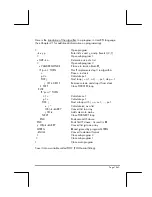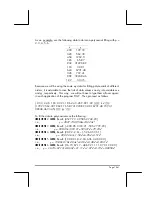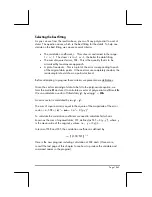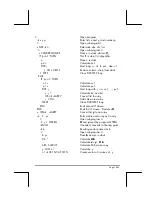
Page 20-3
To activate any of those functions you simply need to enter the function
argument (a number), and then press the corresponding soft menu key.
In ALG mode, the list to be entered as argument of function TMENU or MENU
is more complicated:
{{“exp”,”EXP(“},{“ln”,”LN(“},{“Gamma”,”GAMMA(“},{“!”,”!(“}}
The reason for this is that, in RPN mode, the command names are both soft
menu labels and commands. In ALG mode, the command names will produce
no action since ALG functions must be followed by parentheses and
arguments. In the list shown above (for the ALG mode), within each sub-list
you have a label for the key, e.g., “exp”, followed by the way that the
function will be entered in the stack so that the argument to the function can
be typed at the prompt, e.g., “EXP(“. We need not worry about the closing
parenthesis, because the calculator will complete the parentheses before
executing the function. The implementation of function TMENU in ALG mode
with the argument list shown above is as follows. First, we enter the list, then
we produce the temporary menu (see menu key labels) by using function
TMENU(ANS(1))
. We also show, in the left-hand side, the result of
pressing the
@@exp!
soft menu key, i.e., the prompt
EXP(
. After typing
8`
the result of the operation is shown in the right-hand side:
A simpler version of the menu can be defined by using
MENU({{”EXP(“,“LN(“,“GAMMA(“,”!(“}).
Enhanced RPN menu
The list presented above for the ALG mode, can be modified slightly to use in
the RPN mode. The modified list will look like this:
{{“exp”,EXP},{“ln”,LN},{“Gamma”,GAMMA},{“!”,!}}
You can try using this list with TMENU or MENU in RPN mode to verify that
you get the same menu as obtained earlier in ALG mode.






























